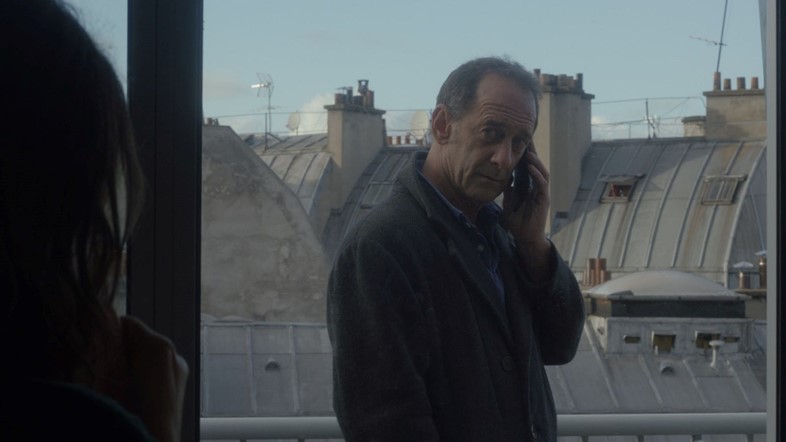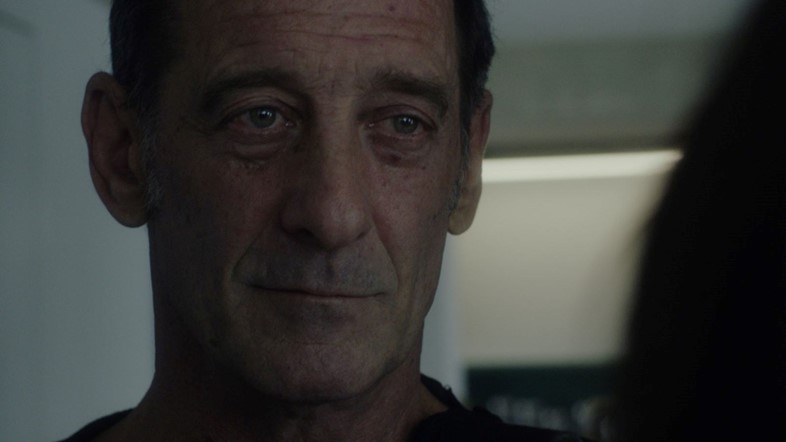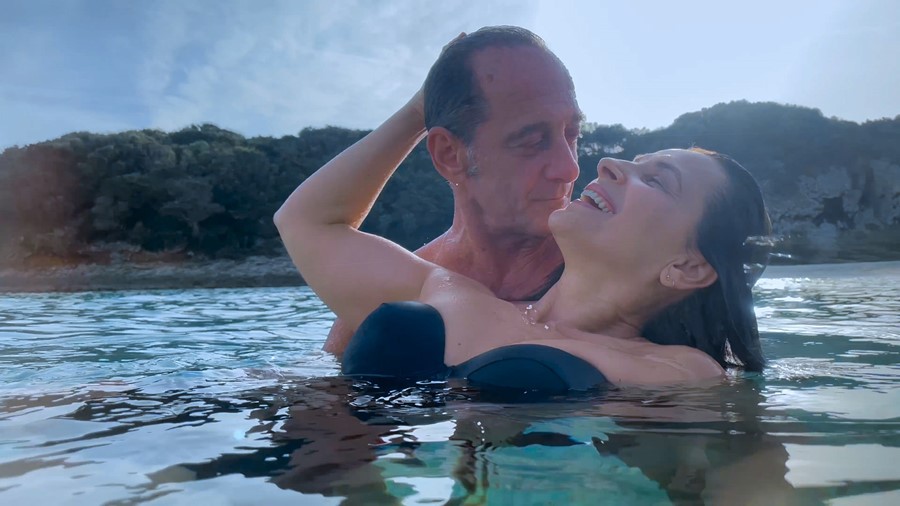As her new film Both Sides of the Blade is released, the French auteur talks about Juliette Binoche’s intense acting methods, anxiety as a driving force for filmmaking, and her aversion to intimacy coordinators
Both Sides of the Blade is the name of Claire Denis’s new film and a description of how she handles journalists. If the 76-year-old French auteur doesn’t like a question, she will let you know. The film itself, Denis’s fifteenth feature, is a moody, Tindersticks-scored drama starring Juliette Binoche and Vincent Lindon as Sara and Jean, a Parisian couple who disguise their true emotions from each other. Sometimes in the film, which was shot in 2021, the masks are more literal. In one scene, Sara cries behind her N95 mask, literally covering up her sadness; in another, Sara is on a balcony when the man below dramatically removes his mask to reveal he’s her ex-lover, François (Grégoire Colin).
In 2021, Denis also shot her sixteenth film, The Stars at Noon, which means she’s been particularly busy of late. When I meet the legendary filmmaker in Curzon’s office at the end of August, she confesses that she’s tired. She’s travelled from Paris and needs a few minutes of small talk and an espresso before readying up for an interview. “I’m a little exhausted,” she says. “All the English speaking.” When the coffee arrives, she groans in a comically exaggerated tone, “Can I have some sugar? I’m so weak.”
However, Denis instantly energises when discussing Both Sides of the Blade, particularly its lead acting trio. In what seems like a mathematical impossibility, Binoche, Lindon and Colin are all Denis regulars who had never shared the screen before. Separately, Sara and Jean are like indoor fireworks waiting to explode; together, their fraught, verbal battles are terrifying. Some of the on-screen tension, it turns out, may have started off-screen.

“Juliette has a way to work, and she would like everyone to work like her,” Denis explains. “Vincent has another way to work. But it wasn’t bad for the film.” I tell her that it paid off in the centrepiece: a lengthy argument scene that just stops short of Lindon punching a wall like Adam Driver did in Marriage Story. “If Vincent changed one word, Juliette would scream at him. Of course, the argument was written. They learned it. But there was so much. Me and the DP were broken. We were in tears at the end … Juliette said, ‘Let’s do it non-stop, for eight hours, until we collapse.’ And that’s what we did.”
Denis, many believe, is the world’s greatest living filmmaker. Her career highlights include the cannibal horror Trouble Every Day, the teen drama US Go Home, and, my personal favourite, the Lindon-starring romance Vendredi soir (Friday Night). More recently, she’s gained a newfound young fanbase with High Life, an erotic sci-fi that starred Robert Pattinson and Andre 3000, and constant namechecks from all your favourite filmmakers. Barry Jenkins’s Twitter bio reads “Claire Denis disciple”; in press for White Noise, Noah Baumbach has become yet another director to name Beau travail as a key inspiration.
Moreover, Denis doesn’t repeat herself. I assumed Both Sides of the Blade would be in the vein of Denis’s 2017 sex comedy Let the Sunshine In, which was also co-written by Christine Angot and starred Binoche. But Both Sides of the Blade is far darker (the title should’ve been a giveaway), more melodramatic, and plunges the viewer into the depths of the three characters’ sadness. Technically, that triangle of sadness is connected to Angot’s private life – Denis and Angot adapted the script from a piece of autofiction Angot published in 2018. However, Denis denies that Sara is a recreation of the author. “Christine’s novel is so personal, I tried to change it. I didn’t want to describe someone I like, like Christine. It would have been indecent.”

So how did she create Sara? “I did it in my head,” Denis shoots back, bemused by the question. “I did it by imagining it. I did it by writing the script.” For their professions, Sara is a radio presenter, Jean is a rugby scout. “I love people who work in radio. I thought it’d be great for her. And rugby was important for my father when I was young.” However, it’s Sara, not Jean, who chats to Lilian Thuram, the World Cup-winning footballer, about the philosophy of Frantz Fanon. Does that mean she’s a football fan? “Lilian Thuram is a friend of mine. He’s a special guy. I’m a soccer fan, more than rugby.” Would she do a football film? “I could. But life is not so long. To make a film is a long time.”
Agnès Godard, the cinematographer of 10 of Denis’s films, was unavailable in 2021, so Both Sides of the Blade and The Stars at Noon mark Denis’s first time with Éric Gautier as her DP. “Agnès and I are both very anxious people,” Denis says. “We have a different way of being anxious. Éric is also very anxious – but in a different way. I think anxiety is a part of making films.” After Denis praises Gautier as a collaborator, I mention speaking to a filmmaker who cited Gautier’s cinematography as an influence for bringing dialogue to life on screen. Did Denis ever have that in mind? “I would never work with someone that is ‘good for dialogue’,” Denis responds. “It’s horrible to say that! How could you choose a DP because he’s good for dialogue? In The Stars at Noon, there’s not much dialogue.”
Adapted from a Denis Johnson novel, The Stars at Noon received strong reactions at Cannes – some positive, some negative, very few in-between. The starry cast includes Joe Alwyn, former AnOther cover star Margaret Qualley, and Benny Safdie. Ultimately, it won the Grand Prix at Cannes, effectively the prize for second place. Much of the online discussion concerned the numerous sex scenes. So I ask Denis if A24 asked her to use an intimacy coordinator.
“I met them when I did High Life. When I was in Panama (to shoot The Stars at Noon), they came to visit us.” She pauses. “What do you mean by an intimacy coordinator?” I describe an intimacy coordinator as someone on set who speaks with the actors about what they’re comfortable doing in a sex scene. Would she ever use one? “Never. I would never use one.” I note that they seem quite common in American and UK productions nowadays. “It’s their problem, not mine. I would hate to have such a thing, such a person on my set. It’s enough difficulty to do that with actors, the intimacy, and the DP. If there’s a stranger on the set? Fuck no.”
I mention reading a Guardian interview Alwyn did in which he specifically praised the project’s intimacy coordinator. “Joe Alwyn never complained when working with me. He never asked me for one.” I add that, from memory, he was referring to Conversations with Friends. “Maybe for TV it’s different. There are 200 people on the set. And I’ve seen the TV show. I think he’s sexier in The Stars at Noon.”
Denis is unsure about when The Stars at Noon will hit UK cinemas. She’s also unsure about what will be her seventeenth film. One possibility is a drama set in South Korea that would be her third collaboration with Angot. I joke that, whatever she does next, she should use an intimacy coordinator. “Never! No. Come on!” Later, in the hallway, when I’m leaving the building, she adds, “If there’s a big crew, you say: go away. To have a stranger on a set is worse. When it’s only the DP and director there, they feel the scene.”
Both Sides of the Blade is in UK cinemas and exclusively on Curzon Home Cinema from September 9.
